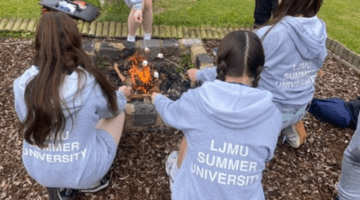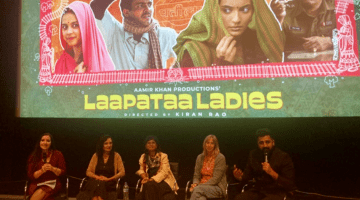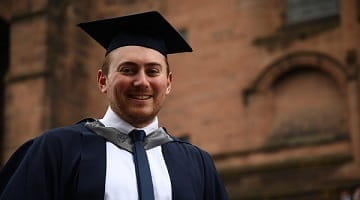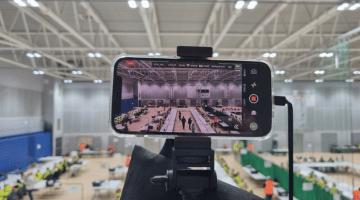About this course
Excellent research opportunities await at the Liverpool Screen School, enabling you to work at the forefront of developments with leading experts.
- Study full or part-time over two to seven years
- Choose from a wide range of subject areas (see Details tab for more information)
- Complete your research degree (MPhil/PhD) in a Faculty known for its internationally-acclaimed research
- Explore scholarship opportunities
- Benefit from expert supervision and researcher training
- Enjoy excellent facilities and great employment connections
The programme route you undertake will depend on your qualifications and experience.
On joining LJMU you will be allocated up to three supervisors (including a Lead Supervisor) who will work with you during your studies. Progression monitoring is undertaken formally and informally by this team on an ongoing basis.
Throughout your studies, you will also have the support of LJMU’s Doctoral Academy which offers expert advice and guidance to those enrolled on MPhil and PhD programmes.
Course modules
Discover the building blocks of your programme
Explore excellent postgraduate research opportunities at the Liverpool Screen School and benefit from a learning environment at the forefront of contemporary developments and a team of experts who regularly contribute to international initiatives.
The Liverpool Screen School offers a warm and friendly environment, founded on a strong commitment to nurturing and supporting creativity; excellent learning resources and first-class student support. As a postgraduate researcher, you will work alongside professional, experienced and enthusiastic academic staff with extensive and current practical industry experience.
The School is part of the BBC North Developing Talent Scheme and has close links with local and national news organisations, including the BBC and ITV. Our academic team has a growing international reputation, winning contracts with the British Council to liaise with universities abroad and securing research grants from national and international funding bodies.
Staff have all worked in the industry and have years of experience in print, radio, television and online journalism. Many also have an excellent record of research and are widely published.
Conducting an individual and exciting body of research in the field of drama, film studies, media production, journalism or writing you will be allocated an appropriately experienced supervision team. This team will work with you throughout your research project. One supervisor will be appointed as your Director of Studies with responsibility for providing you with regular constructive feedback and guidance so that you can achieve your research goals.
Within our School we have three distinct research groups:
- Media, Culture, Communications
- Writers’ Workshop
- Drama and Performance
We also collaborate with external partners, such as: Willy Russell, the Everyman and Playhouse Theatre, Sound City, Writing on the Wall, The Bluecoat, Tate Liverpool, Lancashire Constabulary, the social services within Lancashire and the Royal Court Liverpool.
We aim to build on our existing research strengths and welcome the emergence of new strands and interests in our already diverse research community.
Further guidance on modules
Modules are designated core or optional in accordance with professional body requirements, as applicable, and LJMU’s Academic Framework Regulations. Whilst you are required to study core modules, optional modules provide you with an element of choice. Their availability may vary and will be subject to meeting minimum student numbers.
Where changes to modules are necessary these will be communicated as appropriate.
Your Learning Experience
An insight into teaching on your course
To complement your research, specific training needs will be identified on an individual basis. You can study topics such as:
- Advanced Presentation Skills
- Applying for Ethical Approval
- How to be an Effective Researcher
- Poster Presentation/Design
- Postgraduate Employability Skills
- Project Management
- Writing Skills including Creative Planning for Writing your Thesis
- Surviving the Viva
- Speed Reading
How learning is monitored on your programme
To cater for the wide-ranging content of our courses and the varied learning preferences of our students, we offer a range of assessment methods on each programme.
Final examination for both the MPhil and the PhD is by thesis and oral examination.
The MPhil differs from the PhD in terms of the depth of study required and the extent of your personal contribution to knowledge. It requires competence in conducting an independent enquiry as well as in the use of appropriate research methods and techniques. Examiners will expect you to display satisfactory background knowledge of the subject.
To gain a PhD you are expected to show mastery of a special field and to have made an original personal contribution to the understanding of a problem, the advancement of knowledge, or the generation of new ideas. Examiners will expect you to be at the forefront of understanding in your chosen topic.
Where you will study
What you can expect from your School
The School is based in the Redmonds Building, in the heart of the bustling Mount Pleasant Campus and Liverpool’s growing Knowledge Quarter. Redmonds is shared by three Schools within the Faculty of Arts, Professional and Social Studies making for a rich blend of student learning experiences.
The building is home to high quality lecture theatres and seminar rooms, broadcast studios, news rooms, media production suites, social spaces and a café. It is only a short walk from LJMU’s Aldham Robarts Library, which contains all the resources you will require for your studies, and is open 24 hours a day, seven days a week.
Career paths
Further your career prospects
LJMU has an excellent employability record with 96% (HESA 2018) of our postgraduates in work or further study six months after graduation. Our applied learning techniques and strong industry connections ensure our students are fully prepared for the workplace on graduation and understand how to apply their knowledge in a real world context.
Studying for a postgraduate research degree enhances your employability in a number of ways.
As well as enabling you to focus on your specific areas of interest and expand your subject knowledge ready for employment in your chosen sector, a postgraduate research qualification enables you to take charge of your career path by demonstrating your contribution to an area of knowledge. It enhances your self-confidence and showcases your ability to work independently and ‘go it alone’.
According to a report by the Higher Education Statistics Agency (HESA), more than a quarter of graduates felt that their employment prospects were increased by their PG qualification. And when it comes to earnings, those with a postgrad qualification have been shown to earn an average of 24% more than those who leave education with an undergraduate degree.
Some postgraduate research students are already in full-time employment when they begin their studies, whilst others are recent graduates looking to extend their research capabilities and subject expertise.
A good proportion of our students return to their existing roles with enhanced career prospects, others move on to further study or take up teaching roles in educational establishments.
Tuition fees and funding
How to fund your postgraduate research
Securing funding can be one of the main hurdles you face when considering postgraduate research. However, help is available. LJMU has a team of fees and funding experts who can offer advice based on your personal circumstances. You can contact them on 0151 231 3153/3154 or via studentadvice@ljmu.ac.uk
Entry requirements
You will need:
- Minimum of a 2:1 honours degree and Masters degree with a research dissertation in a relevant subject.
- In exceptional circumstances we may consider applicants without a Masters degree based on the level of research training completed in their undergraduate degree programme and any subsequent research work.
- We also welcome applications from those with non-standard qualifications who can demonstrate knowledge, experience, and skills developed in the workplace or other setting relevant to the programme of research. If you do not hold the standard academic entry requirements, please use your personal statement to provide further details. Non-standard applications will be considered by the Admissions Tutor(s) on a case-by-case basis.
Additional information:
- IELTS 6.5 (minimum 5.5 in each component)
- 58-64 (minimum 51 in each component for UKVI purposes)
- RPL is accepted on this programme
If you have any specific queries, please contact apsadmissions@ljmu.ac.uk
How to apply
Securing your place at LJMU
All research degree registrations are subject to approval by the Faculty and University’s Research Degrees Committee. The applications process is as follows:
- Complete and submit your application using this online form (opens in a new tab) attaching official copies of documents (e.g. certificates) and official institution letterhead references. Please refer to additional information below before submitting.
- You will receive an acknowledgement
- Your application will be considered by the Admissions Tutor
- You may need to provide further information or attend an interview
- You will be informed if your application has been successful and will find out about any conditions of acceptance
PhD Application Info
If you wish to enquire about making an application for a PhD or express your interest, please send a CV, brief personal statement and outline of your intended research proposal (no more than 500 words) to apsadmissions@ljmu.ac.uk
The department can then discuss appropriate supervision. You may then be invited to make a full applications or offered information about your potential application.
Should you then wish to make a full application please be aware of the following guidelines prior to submission.
Your application should include two main elements: Personal Statement and Research Proposal. We recommend the following structure:
1.Personal Statement
Approx. 500 words to include:
a) Short paragraph on current role and responsibilities
b) Main paragraph on CV highlights ('greatest hits')
c) Short paragraph on future aspirations including reason for the study and proposed location
2. Research Proposal
Approx. 1500 words to include:
a) Working Title of proposed research
b) Research Aim(s) (maximum three aims)
c) Research Question
d) Background Statement - paragraph including information on the research field
e) Literature Review - paragraph highlighting exemplars in relation to the proposed field of study
f) Methods - paragraph including information on the proposed mode of study e.g. practice-led or thesis only.
g) Proposed Structure - in bullet point form (typically three points will suffice at this stage).
h) Indicative Bibliography - including approx. 10 publications
Your university life
From accommodation and academic support to clubs and societies. Find out what LJMU has to offer.
Related Links
Talk to our students
Connect with a current LJMU student for advice and guidance on university life, courses and more.
See what our students are saying
At LJMU we want you to know you’re making the right choice by studying with us. You can see what our students are saying about their experience with us through their reviews on the following websites:
Related Links
News and views
Browse through the latest news and stories from the university
The University reserves the right to withdraw or make alterations to a course and facilities if necessary; this may be because such changes are deemed to be beneficial to students, are minor in nature and unlikely to impact negatively upon students or become necessary due to circumstances beyond the control of the University. Where this does happen, the University operates a policy of consultation, advice and support to all enrolled students affected by the proposed change to their course or module.


























